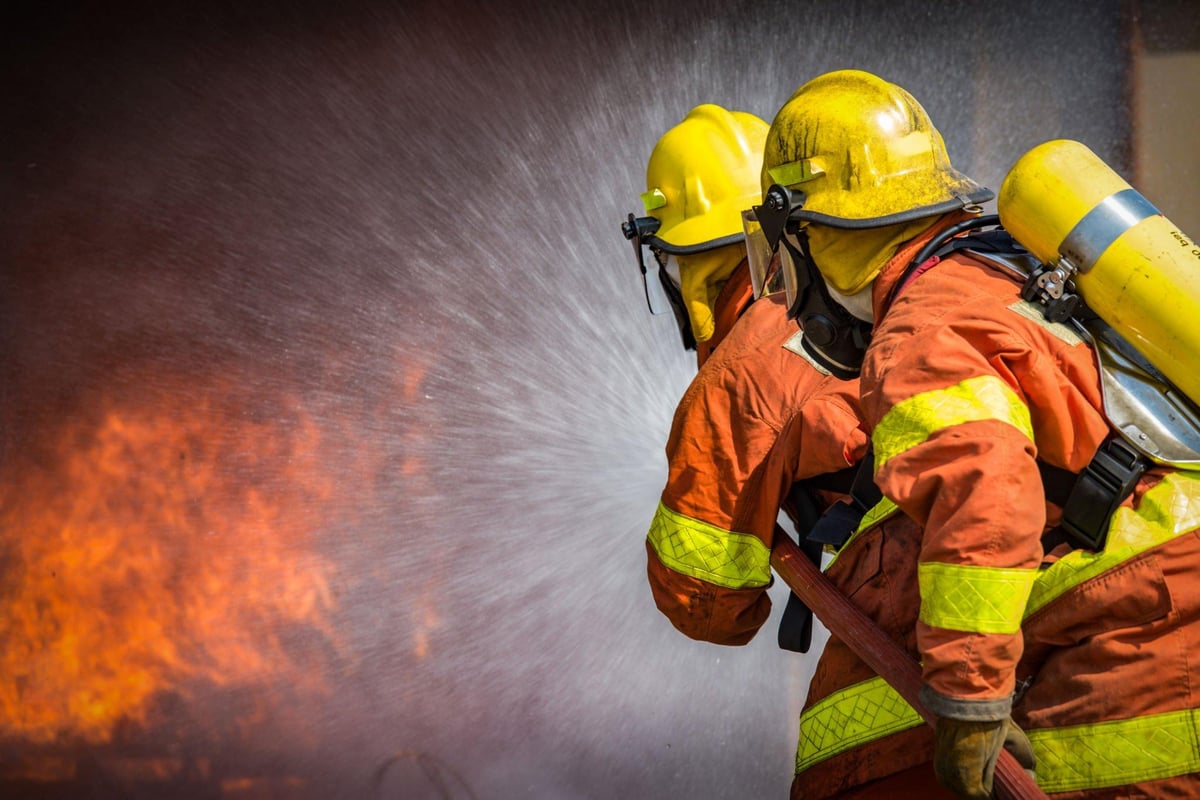Fire Science classes near me in Nashville
In the Nashville metro area, the average cost of a class is $11000 and the average class length is approximately 49 weeks long
Trade and industry classes near
Nashville, TN 37219Online classes
Financial aid
Certificate
Short classes

Liberty University Online
BS: Civil Engineering
- Online, completion in as little as 42 months.
- Option to transfer credits for up to 75% of the entire degree.

Liberty University Online
BS: Aviation Management
- Online, completion in as little as 42 months.
- Option to transfer credits for up to 75% of the entire degree.

Waldorf University
AA Occupational Safety & Health
- Online, estimated completion in 2 years for full-time students
- Covers industrial hygiene, occupational safety, and more
Fire Science classes near me in Nashville
Are you interested in a career in fire science? If you're located in Nashville, you're in luck! There are several fire science classes available in the area that can help you kickstart your career in this rewarding field. In this blog post, we'll explore what fire science is, the training requirements, what to look for in a class, what to expect from the day-to-day class, the certification process, how to find related jobs, and what other classes you can take after becoming a fire science professional.

Introduction
Fire science is a field that focuses on the study of fire behavior, prevention, and suppression techniques. Professionals in this field work to protect lives and property by analyzing fire risks, implementing fire safety measures, and responding to emergencies. If you have a passion for helping others and a desire to make a difference in your community, a career in fire science may be the perfect fit for you.
What is Fire Science?
Fire science is a multidisciplinary field that combines elements of chemistry, physics, engineering, and public safety to understand the science behind fires and develop effective strategies for prevention and suppression. Students in fire science classes learn about fire behavior, fire dynamics, fire investigation techniques, hazardous materials handling, emergency response procedures, and more.
Training Requirements
To become a firefighter or pursue a career in fire science, certain training requirements must be met. These requirements may vary depending on the specific position and location, but some common prerequisites include:
- High school diploma or GED equivalent
- Minimum age requirement (usually 18 or 21 years old)
- Physical fitness and agility tests
- Background checks and drug screenings
- EMT certification (in some cases)
What to Look for in a Class
When searching for fire science classes near you, it's important to consider a few key factors to ensure you find the right fit for your needs. Here are some things to look for:
- Accreditation: Make sure the class or program you choose is accredited by a recognized accrediting body. This ensures that the curriculum meets industry standards and that your training will be recognized by potential employers.
- Experienced Instructors: Look for classes taught by instructors with real-world experience in the field. Their expertise will enhance your learning experience and provide valuable insights.
- Hands-on Training: Fire science is a hands-on field, so it's crucial to find a class that offers practical training exercises. This will give you the opportunity to apply what you've learned in a simulated environment.
- Networking Opportunities: Consider classes that provide networking opportunities with professionals in the industry. This can help you build connections and gain insight into potential career paths.
What to Expect from the Day-to-Day Class
Fire science classes typically combine classroom lectures with practical training exercises. Here's what you can expect from the day-to-day class experience:
- Classroom Lectures: You'll learn about fire behavior, fire prevention techniques, emergency response protocols, and other relevant topics through lectures delivered by knowledgeable instructors.
- Hands-on Training: You'll have the opportunity to participate in practical exercises that simulate real-life fire scenarios. This may include practicing fire suppression techniques, conducting fire investigations, and handling hazardous materials.
- Physical Fitness Training: Firefighters need to be physically fit, so expect to participate in physical fitness training sessions to build strength, endurance, and agility.
- Teamwork and Collaboration: Firefighting is a team effort, so expect to work closely with your classmates on group projects and training exercises. This will help you develop communication and teamwork skills.
Certification Process
After completing your fire science classes, you'll need to go through the certification process to become a firefighter or pursue other fire science-related careers. The specific requirements may vary depending on your location, but here are the general steps:
- Written Exam: You'll need to pass a written exam that tests your knowledge of fire science principles, emergency response procedures, and other relevant topics.
- Physical Agility Test: This test evaluates your physical fitness and ability to perform essential firefighting tasks, such as climbing ladders, carrying heavy equipment, and rescuing individuals.
- Background Check and Drug Screening: To ensure the safety and integrity of the profession, you'll undergo a background check and drug screening.
- Medical Evaluation: A medical evaluation is typically required to ensure that you're physically and mentally fit for the demands of the job.
- Training Academy: If you pass all the previous steps, you'll likely be required to attend a training academy where you'll receive further instruction and hands-on training.
How to Find Related Jobs
Once you've completed your fire science training and obtained the necessary certifications, you'll be ready to start your career in the field. Here are some ways to find related jobs:
- Local Fire Departments: Check the websites or career pages of local fire departments in Nashville to see if they're hiring. They often post job openings and provide information on how to apply.
- Networking: Reach out to professionals in the field, attend career fairs, and join fire science-related organizations to expand your network. Networking can lead to job opportunities that may not be publicly advertised.
- Online Job Platforms: Utilize online job platforms like Indeed to search for fire science-related jobs in your area. These platforms aggregate job postings from various sources, making it easier to find relevant opportunities.
What Other Classes Can You Take?
Once you've established a career in fire science, there are several other classes you can take to further enhance your skills and knowledge. Here are some examples:
- Emergency Medical Technician (EMT) Training: EMT training can be beneficial for firefighters, as it equips them with the skills to provide basic medical care in emergency situations.
- Hazardous Materials Handling: In-depth training in hazardous materials handling can be valuable for firefighters who may encounter hazardous substances during their work.
- Incident Command System (ICS): The ICS is a standardized approach to command, control, and coordination of emergency response efforts. Taking classes in ICS can enhance your ability to manage emergency situations effectively.
Final Thoughts
If you're passionate about helping others and are interested in a career in fire science, there are plenty of options available in Nashville. By completing fire science classes and obtaining the necessary certifications, you can embark on a fulfilling career in this rewarding field. Remember to consider factors like accreditation, experienced instructors, hands-on training, and networking opportunities when choosing a class. And don't forget to utilize resources like Dreambound to find related jobs and explore other vocational classes and career options. Good luck on your fire science journey!
If you're exploring options in this field in various locations, Dreambound's extensive guides are a great resource. We've got detailed insights for numerous cities. check out some additional guides below:
- How to Become a Firefighter in Florida
- How to Become a Firefighter in Idaho
- How to Become a Firefighter in Maryland
- How to Become a Firefighter in Oregon
- How to Become a Firefighter in Utah
Thinking about making a career switch? Dreambound has written thorough guides to help you understand different options available to you.
FAQ
What is Dreambound?
Dreambound is the largest platform for students to find career & technical training programs. While we can't guarantee a career outcome, our mission is to provide all the information you need to find the perfect program for you.
What programs do you offer?
Dreambound has over 70 programs across healthcare, technology, business, and industrial trades. This includes programs such as Medical Billing, Cybersecurity, and welding.
Do you offer financial aid?
Some of our schools offer financial aid for those who qualify. Many others offer payment plans, where you can pay the cost of class over time.
Is it possible to do online classes?
Yes, Dreambound offers many online programs. On Dreambound's search, you can filter by online, in-person, and hybrid (part online, part in-person).
